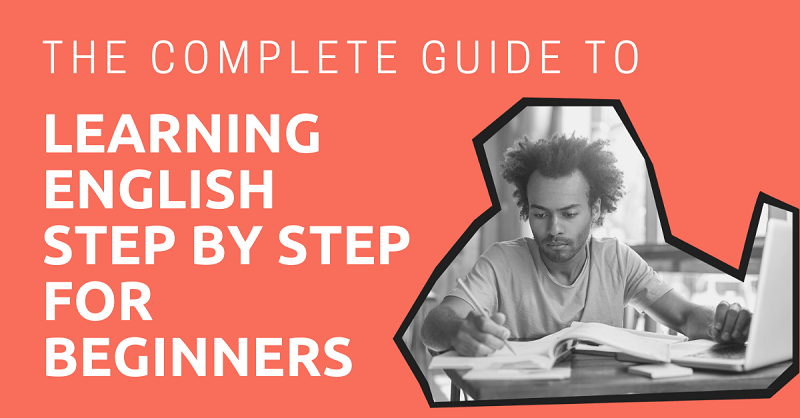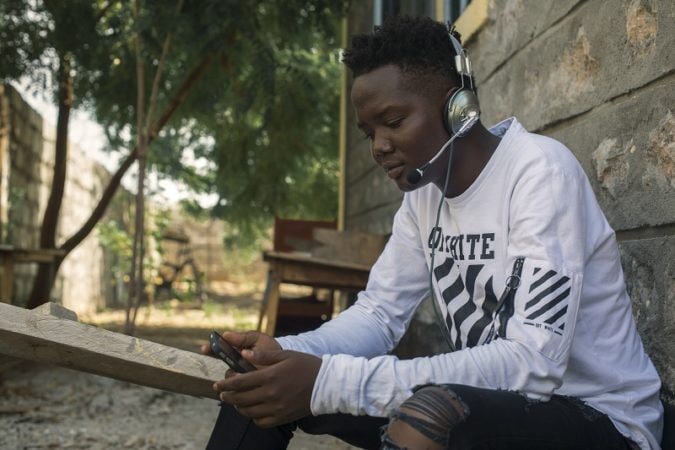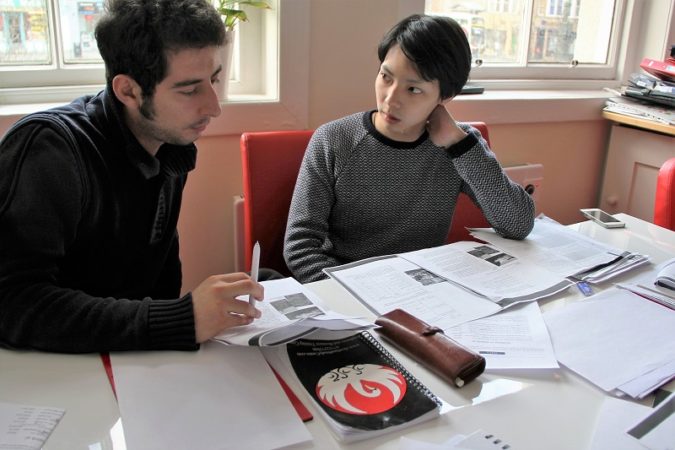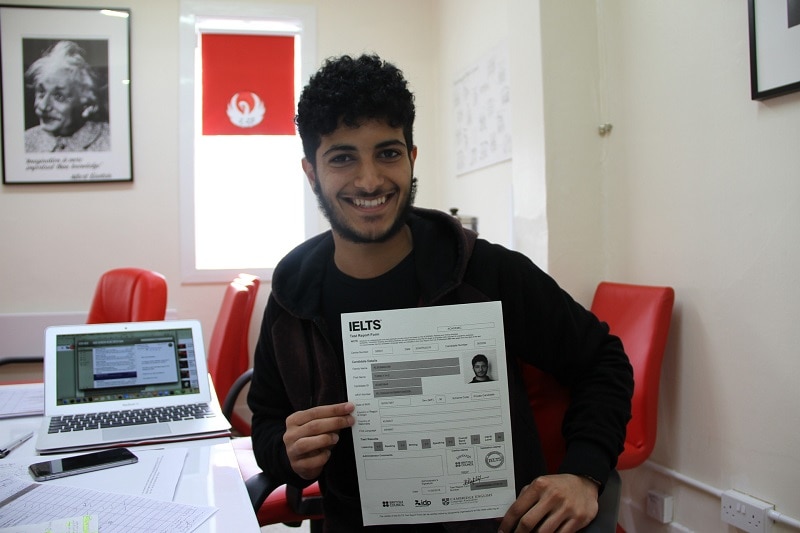
Everyone learns English for different reasons.
Some people want to study abroad, some want more job opportunities, and others want to be able to travel the world easier. Nobody is the same. But learning a new language can be very scary.
That said, why are you learning English?
There is so much to learn and so many ways to learn it. These feelings can make it hard for you to keep going as your goal seems too far away and difficult.
Only you know what you want and why you want it. For this reason, you need to understand yourself.
Think long and hard about why you want to learn English. Keep thinking until you find a reason that is clear and meaningful to you.
You need to make sure that it is a really strong reason. After you do this, write it down and keep it.
You should also write down the negative thoughts you have about learning English. Maybe you feel like you need to live abroad to get good at English.
Maybe you think you need teachers to get good English, which you may not have the time or money for.
Both of these reasons are not true, but they are negative thoughts that may come to mind. You should also write the date that you made these notes, this will become helpful in a later tip at the end of this article.
The best time to do this step is before learning a language. The second-best time is now.
If you need an easy way to learn English fast and effective, it is a good idea to use a private tutor. Although it can be more expensive than other methods, a private tutor can quickly improve your English level and practice your skill. You can use Live Lingual to find an experienced private English tutor online.
This article will take approximately 17 minutes to read. Don't have the time right now? No worries. You can email the ad-free version of the article to yourself and read it later!
Disclaimer: This article may include links to products or services offered by ExpatDen’s partners, which give us commissions when you click on them. Although this may influence how they appear in the text, we only recommend solutions that we would use in your situation. Read more in our Advertising Disclosure.
Contents
Plan Your Learning
Learning a language is a big task.
It is important that you do not just jump into the language and hope for the best. You need a plan, and the plan has to be personal to you. It is you that is learning the language and nobody else.
After you have made your notes for why you want to learn English and the negative thoughts you have, you should write down two or three simple goals.
You need to think of a short-term goal.
What do you want to be able to do in two to six months? You should think about what actions you will take every day. For example, learning for 30, 45, or 60 minutes every day.
You also need to think about your schedule. Ask yourself these questions:
- When can you learn English?
- When is a good time for you?
- Do you feel too tired after work?
Setting aside 30 minutes every day is not too long, but you need to find a good time slot. Making a plan like this will help you to guide yourself and help you to have the energy to learn.
Be Realistic
When you feel like you are doing well, you can start feeling over confident.
If after just three months of learning you watch a movie, you may end up losing confidence. Native level speaking is very difficult to understand and needs language input over a long time.
So, how do you get there from nothing? The answer is comprehensible input.
When you watch something, you need to be able to understand 70 percent to 90 percent of what is being said for it to be useful.
When you learn words and phrases, you need to make sure that you find content that uses them. What you already understand will help you to understand the 10 percent to 30 percent that you do not.
You learn from what you mostly understand, until you can understand it all.

Once you understand all of what is being said in the audio, move onto the next thing.
You can also help yourself to move on with a few extra tools. To begin with, when you use an audio resource, see if it has printed text or subtitles.
Other resources may also have videos that come with the audio, which will help you understand the content through context.
These things also make your learning more enjoyable, as it can act as entertainment and helps you connect words with sounds.
If you do this enough in the beginner stage, then it will help you to get to higher levels faster.
Find Good Resources
The biggest mistake that people make when learning a new language is to download lots of apps or buy lots of books.
This may feel like you are giving yourself lots of useful options, but it will have the opposite effect. When you have too many resources to choose from, you don’t know where to start.
This happens a lot with video streaming.
We end up looking for something to watch more than actually watching something. Pick just one resource on day one to start with, and then stick with it for a few months. If it did not work for you, then change it.
But how do you choose a resource that is right for you?
Firstly, it has to be comprehensible. It also has to be enjoyable. The more you enjoy learning English, the more you will want to do it.
This means that you will have more energy to focus on learning English when your planned learning time arrives.
Finally, it should be useful. As a beginner, you do not want long literature texts, for example.
There are many good resources out there. A few well-known apps are:
Other websites like the following all have a variety of topics with audio, video, and text that are made for English language learners of all levels.
With these, you will always be able to find something useful and interesting. Set one day for researching a resource that is right for you.
Avoid Focusing on Grammar
Adults like to focus on grammar. It seems like it would be the most important thing to learn, because that is how we make sentences.
But if you look at a child, they are able to speak a language before they understand any grammar. This is because they learn through being around the language every day.
As adults, we should look at children who learn this way and try to be more like them.
Listen to dialogues and conversations of real natives. You can still use grammar books and notes, but only use them when you need to understand things more clearly.
Do not make them the focus of your learning. You should not spend more than 25 percent of your time learning grammar. Grammar can be boring, and boring things can make us slower learners.
Memorize Vocabulary
To be able to learn grammar through the language itself, you need to have a good amount of vocabulary.
How do you build the vocabulary that you need to do this? Repetition is key.
However, always repeating vocabulary you have learned in the same way will not help you. You need to practice dynamic repetition.
Dynamic repetition means taking a word you have learned and using it in new ways. This could be by trying to use the word in three or four different sentences through writing or speaking.
It could be by using an application to repeat vocabulary by hearing it and then translating it, picking the meaning from multiple choice, or just repeating it while reading the definition.
Moreover, it could even be as simple as writing it down as many times as you feel you need to and reading it over and over again.
It does not matter which way you do it, as long as you make sure to keep changing the way you do it.
Using many methods like this helps keep your brain focused as you learn in new and interesting ways.
Also, many words have multiple meanings. The context of a sentence gives a word its meaning.
For example, the word heart could be the organ inside your body, it could mean the central part of a place “the heart of the city,” or it could mean having an emotional talk “a heart to heart.”
For words like this, you need to make sure that you take the sentence it appeared in, copy it, and create your own sentences using the different meanings.
Words learned on their own can lose meaning as you have many definitions to remember. Using words like this in sentences helps you make a stronger connection to these different meanings.
You also need to select the words you learn.
When you read a text, there will be a lot of words you do not know. The first thing most people do is underline all of the words they do not know and then look them up, but this is not a good way of learning.
A better way is to only focus on the words that are important to you and your own interests. If a word is not interesting to you, then your brain will forget it. This happens in your native language just as much as it does in English.
For example, if you are not interested in engineering, how many engineering words will you remember after reading a text in your own language?
It is better to chose a third of the words you did not understand and focus on those, and ignore the ones that are not interesting or important to you.
Deconstruction also helps with understanding more vocabulary. Learn the meanings of prefixes and suffixes that you come across. If you keep seeing the prefix un-, learn how it changes a word.
Once you learn that it makes a word negative, you will have improved your vocabulary by more than that prefix as it attaches to many words.
Finally, practice note taking. Written words stay, whereas spoken words come and go in seconds.
Make sure you have something to take notes. This can be through paper and pen or technology like your phone. Both are useful for learning a language.
You want to be able to make the best use of your time and use that time in the best way you can. Using pencil and paper for taking notes is great for connecting you to the language, and it helps you to remember words through this connection.
Phones are great because it is always there and is quick. You can use voice recording apps to record new words you have learned and then write notes later.
When you do make notes, write a date on them and file them away with the notes you made at the start of this article.
Use all Four Language Skills
Knowing a language takes many skills.
You need to be able to practice reading, listening, speaking, and writing to learn English well.
If you only focus on one, you will have problems. You may be able to read well, but not be able to follow conversations.
You may be able to listen and read well, but not be able to make your own sentences while speaking or writing.
This happens because listening and reading practice does not equal speaking and writing practice.
The problems that you have in one language skill shows the choices that you have made while learning English.

You need to improve all four of these skills by practicing each of them.
This does not mean that you have to split your learning into four different parts each day, but it does mean working on them over a week, month, or even a year.
Practicing all four of these skills will improve your English. Moreover, you will be able to use these skills to try new and interesting methods when you change your learning style.
Find a Method that Works for You
There are lots of videos on the internet and lots of social media posts that say their method is the best.
The truth is, this cannot be true for everyone.
Language learners all learn in different ways. The best language learners know this.
People always want the best, fastest, and cheapest way to learn a language, but this does not exist.
What is best for me may not be what is the best for you. You need to make sure that the method that you choose fits your interests, learning style, and schedule.
Your personality, tastes, and what pushes you to continue are more important that what other people think is best.
For every method out there, there is someone who loves it. But maybe you do not. If you do not enjoy what you are doing, you won’t learn.
You learn best from things that you find interesting. Doing things that you enjoy means finding topics and activities that you like and using them to learn English.
If you find something boring, then do not force yourself to keep going, no matter how good other people claim it is.
If you continue with a method that you find boring, then you will find yourself stressed, tired, and not caring about English.
This will mean that you will learn less if you continue.
If you have already learned another language before, do not only focus on the method that you used for that language.
Different languages may need different methods. Chinese is not the same as English, and both have different rules.
The method that you choose should fit the language. You should not have to force the language to try and fit the method.
To make sure that the method you are using is right for you, you need to ask yourself two questions:
- Am I enjoying this?
- Is this useful to me, and is it helping me?
You have to be able to answer yes to both of these questions for the method to be good for you.
The language learning method that you use should make you want to wake up every morning, or come home from work ready and excited to learn so that you can stick to your plan.
If you answer yes to one question, change your method. If you answer no to both questions, then try a new method.
You should reflect on the method you are using once a month. If your feelings change, don’t be afraid to change with them.
Answering these questions lets you be realistic and willing to change so that you can get more out of your learning.

Your method should not only be exciting, but something you do every day.
If you do this, then time will become your best friend. When people think of language learning, they think that talent is the most important thing, but this is not true.
If you learn every day, even if it is just for 30 minutes, then you will improve every day.
No matter how small those improvements are, each improvement will make you better. If you keep improving in this way, then your English will build up until it is better than you ever thought it could be.
Learn Pronunciation from the Start
Learning to pronounce words takes practice.
It is not just understanding the sounds of a language, but also the movement of the muscles in your mouth, jaw, the position of your tongue and throat, and more.
These physical actions take a long time to perfect.
If you pronounce words badly from the start, it will only make it harder to fix later in your learning.
You may still be pronouncing things wrongly past the beginner stage and into the intermediate and advanced stage unless you start practicing them the right away.
Understanding phonetics, intonation, and physical movements are all important for practicing pronunciation.
These resources are all useful for learning pronunciation:
- Oxford Online English
- EnglishClub’s IPA chart
- Cambridge Dictionary
- Oxford Learners Dictionary
- Merriam-Webster Dictionary
You can even read an article I wrote about how to improve your English accent here.
Now, on to You
The main reason that people give up on their language learning is because they have no human contact.
You may feel that you cannot learn a language if you do not have the chance to speak it with people all the time.
This is not true.
Learning English is not just about learning the language, it is also the social and cultural experiences, and finding out new things about yourself. Let these things be your rewards.
Online learning communities like r/languagelearning, r/Language_Exchange, and r/EnglishLearning can also help you form relationships with other language learners.
Making new relationships with people like this also helps you feel rewarded. Rewarding feelings like this also help you to continue learning the language.
A reward that you can give yourself is with all of the notes you have been taking.
Remember the advice from beginning of this article? You will have notes on why you are learning English, the negative thoughts you had about learning, and your plan.
On top of this, you will have a log of all the notes you have taken in date order.
Read your notes after the time period you set for your two to three simple goals. It is easy to lose track of the progress you have made when it happens every day.
Looking back over six months and seeing how much you have achieved, how you overcame your negative thoughts, and how you are one step closer to learning English will help you to realize just how far you have come.
The rest of your notes will show you how hard you have worked to get there. Once you have read them, set some more goals so that in six more months you can push yourself even further.







